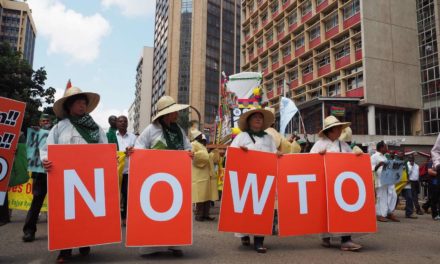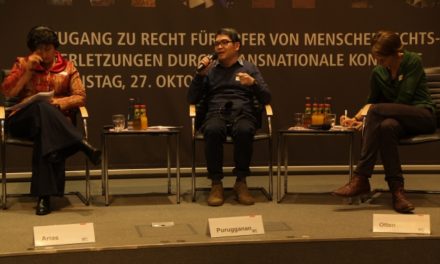By Walden Bello
The final declaration of the Second Ministerial of the World Trade Organization affirmed the intention of the member states to review the various agreements of the Uruguay Round, including that of agriculture.
There are various interpretations, however, as to what review means.
To a bloc consisting of the European Union, Japan, and Korea, the review should be limited to thata review of the implementation of the Agricultural Agreement and addressing the problems encountered in the implementation. Under severe pressure from farm lobbies, this group is strongly against conceding any more cuts in subsidies and domestic support than were agreed upon during the Uruguay Round.
To the Cairns Group, a 15-member group of developed and developing country agricultural exporters, the 1999 review should mean a renegotiation of the Accord to further cut down allowable levels of export and domestic subsidies. In the view of Cairns member countries, the greatest distortions of agricultural trade stem from the $280 billion in agricultural subsidies in the OECD countries, most of which is provided by the European Union and the United States. Over 40 per cent of the total value of production in the OECD countries is now accounted for by different forms of producer subsidies.
The Cairns group’s concerns and expectations in new negotiations were articulated by Philippine Trade and Industry Minister Cesar Bautista in his speech on May 18: The Agricultural Agreement as it now stands provides for firm and transparent disciplines and meaningful market commitments in market access but with respect to domestic support measures and export subsidies, the disciplines have been less defined and the commitments less substantial. This has perpetuated the uneveness of the playing field which the multilateral trading system has been seeking to correct. Moreover, this has placed the burden of adjustment on developing countries relative to countries who can afford to maintain high levels of domestic support and export subsidies.
The United States is, according to WTO observers, taking essentially the same attitude as the Cairns Group, with Agriculture Secretary Dan Glickman asserting that the US goals for 1999 included elimination of export subsidies and tightening up of domestic support. The US is said to have come around to even supporting reductions in direct income payments to farmersa form of subsidy that has been exempted in the current Agreement.
The fourth group in the coming agricultural discussions consists of the vast majority of Southern countries. Many are worried that the prospects of new negotiations might end up forcing them into new market openings without significant new openings to their exports in the developed countries. Like India, some countries are extremely worried about the impact of trade liberalization on the incomes of their farmers and food security. With increasing volatility in the supplies of key grains like rice in world markets owing to factors such as El Nino-induced climate changes, food security or the ability of countries to have access to food at reasonable prices to feed their populations is increasingly a key consideration in the developing countries’ approach to new negotiations. The net effect of these concerns is a position of great reluctance when it comes to further trade liberalization. However, the big agricultural trading powers tend to give short shrift to the views of this numerically large group owing to their political and economic weakness, leaving it up to international NGO’s to highlight and lobby for the concerns of poor farmers, consumers, and citizens in the South.
NGO’s Push for Focus on Food Security
Food security has also now become a major concern of NGO’s focused on agriculture and the WTO. Via Campesina, the international network of peasant organizations and peasant-solidarity groups, has taken a stand that agriculture should be taken out of the WTO altogether since it is a special commodity whose production is bound up with the survival of communities, the maintenance of cultures, and the health of political arrangements.
Other organizations have tried to bring together a loose agenda that both northern and southern NGO’s would bring to the 1999 agricultural review which would build stronger safeguards for food producers and food security in international agricultural trade. This was the purpose of a two-day workshop on Agriculture, Trade, and the WTO held in Geneva on May 15-17, prior to the WTO Ministerial. The meeting drew some 60 participants.
While no common program was evolved, workshops came up with the tentative recommendations in the areas of major concern that were focused on: food security; the special conditions of low-income food-deficit countries; sanitary and phytosanitary standards (SPS) and codex alimentarius; ecolabelling and product and process methods (PPM’s); the Trade-Related Intellectual Property Rights Accord (TRIPs) and agriculture; and the GATT-WTO and sustainable agriculture. Among the recommendations that emerged were the following:
Price instability, food aid, and low-income food-deficit countries
support measures to end dumping on the South by supporting measures to strengthen ant-dumping measures and eliminate export subsidies;
support revision of trade rules so as to take into consideration the negative support or taxation of farmers in the South;
regulate the use of concessional food transfers like food aid to support food security through codes of conduct or international conventions;
create an international food safety net, by implementing, for instance, the Marrakesh Decision on poor, food-deficit countries, with a trigger price mechanism that would make countries eligible for food aid once international prices of commodities rise to certain levels.
Sanitary and Phytosanitary Measures (SPS) and Codex Alimentarius
revise key sections of the GATT 1947 Agreement and the Uruguay round to recognize the precautionary principlea key principle of environmental legislationas a valid and central consideration in trade decisions;
WTO rules must defer to multilateral environmental agreements such as the Convention on Biodiversity when it comes to trade conflicts that are environment-related;
SPS standards must be set democratically by regional forums that draw wide representation from affected sectors;
support participation in standard setting of other, more representative standard-setting bodies, like IFOAM for organic production;
expose shortcomings of Codex Alimentarius as standard-setting body,
especially in terms of representativeness when it comes to civil society and the South;
push for broader and non-restrictive view of what constitutes science in
terms of the methodology of standard setting.
Food security
support inclusion of a Food Security Box in GATT-WTO similar to Green Box consisting of subsidies and other measures that enhance food security;
support inclusion of Rural Community Box that would specify measures
enhancing biodiversity, environmental equilibrium, sovereignty, and sustainability;
support international efforts to push conventions recognizing right to
food as a basic human right and food security such as the FAO chart
Right to Food;
use international human rights institutions to check the WTO and other international trade bodies.
Labelling and Process and Product Measures (PPMs)
Standard-setting should be voluntary;
Organizations representing consumer and civic interests should be involved in setting of standards, not just private enterprises;
Oppose WTO interference with voluntary and private standard setting.
TRIPs and agriculture
Definitely oppose patents on life forms during 1999 review of TRIPs sui generis patent system provision and focus advocacy on recognition of farmers’ rights, community rights, and rights of indigenous peoples;
Exploit contradictions between TRIPs and multilateral environmental agreements like Convention on Biodiversity;
Push for TRIPs to have provision for public participation like European patent systems.
WTO and sustainable agriculture
Push to internalize environmental and social costs in calculation of prices of traded products;
Support and expand rights to subsidies to achieve sustainable production in WTO and other trade agreements;
Gain recognition of strategic objective of creating a sustainable structure of production by WTO and other trade agreements;
Push to exempt measures to sustain subsistence agriculture from GATT-WTO rulesin fact, support movement to get agriculture out of GATT-WTO.
*Dr. Walden Bello, a professor of sociology and public administration at the University of the Philippines and co-director of Focus on the Global South, is co-author of Dragons in Distress: Asia’s Miracle Economies in Crisis (London: Penguin, 1991).









